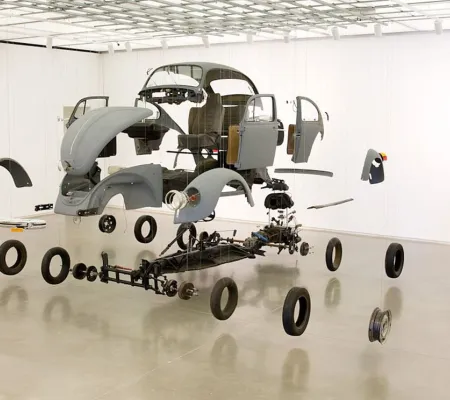This talk focuses on Damián Ortega’s Cosmic Thing (2002), a disassembled Volkswagen beetle—a vehicle indelibly associated with the urban fabric of Mexico City—that the artist methodically reconstructed piece by piece as a suspended sculpture. It considers the various ways that Ortega marshals a plethora of diagrammatic modes (including repair manuals) and forms of non-hegemonic knowledge rooted in the streets of Mexico City to submit modernist sculptural practices to the classed, racialized, and mutable geographies of the megalopolis. A visual pun on urban cosmogonies, the work crystallizes a DIY ethos redolent in contemporary artistic practices, which I argue is rooted in the lived realities of Mexico City and speaks to modes of making, knowing, and seeing in the Global South. As a work both of the city and sited in it, Cosmic Thing raises questions about the tensions embedded in precarity aesthetics and the reinscription of the extractive practices of colonialism.
Anna Indych-López is Professor of Art History at The Graduate Center and The City College at CUNY where she teaches courses on modern and contemporary art among Latin American, U.S., transatlantic, Afro-diasporic, and Latinx networks. She is the author of Judith F. Baca (2018) and Muralism without Walls: Rivera, Orozco, and Siqueiros in the United States, 1927–1940 (2009) and co-author of Diego Rivera: Murals for The Museum of Modern Art (2011). A frequent contributor to exhibition catalogues, such as the Whitney Museum of American Art’s Vida Americana: Mexican Muralists Remake American Art (2020) and The Philadelphia Museum of Art’s Paint the Revolution: Mexican Modernism: 1910-1950 (2016), she is the recipient of a Stuart Z. Katz Professorship of the Humanities and an Alcaly-Bodian CUNY Distinguished Scholar Fellowship at the Advanced Research Collaborate at The Graduate Center. She is investigating interactions between visual artists and Mexico City at the turn of this century, attuned to the ways in which cultural producers registered transformations of the conflicted megalopolis and negotiated its social inequities and racial hierarchies in their works.


